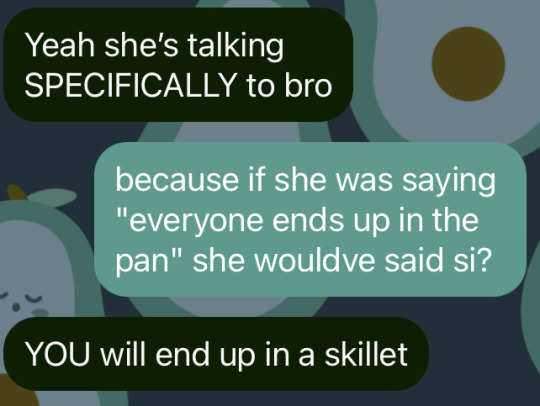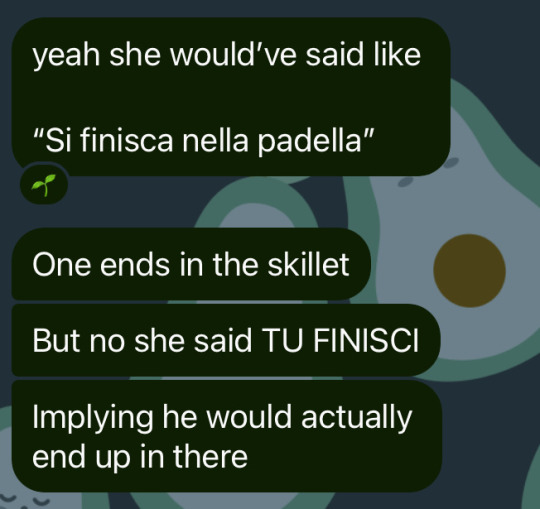#also. daniela's italian voice actor has such a nice voice it fits daniela REALLY well
Explore tagged Tumblr posts
Text
There were some mistakes in the original post which @sixteenthtryry pointed out, so I've edited this a bit! (a lot of the analysis was based on a small grammar thing that i misheard so :,,,D but still fun to me)
(Okay I spent like half an hour trying to find a specific post because brunosaderogatory made a post about how the Italian subs for Luca are different from the Italian dub, and also that the Italian subs are done by AI while the dub is actual human translators, but I can't find it. So jsyk that's the inspo for why-)
I've been transcribing the Italian dub for Luca and I noticed some really silly things already, but one in particular made me laugh/eyebrow raise/"jesus christ, Daniela."
In the lunch scene at the beginning of the movie Daniela says (parentheses are direct-ish translations (hence why it may seem a bit choppy). Disclaimer Italian is not my native language + I'm not super good at it, but I have some Spanish background + a friend who IS good at Italian that helped me translate):
English: Nope, nope! The end! Shut it down! [...] Well, the curious fish gets caught! We do not think, discuss, contemplate, or go anywhere near the surface. Got it?
Sub: No! No! Fine! Dacci un taglio! [...] Beh il pesce curioso viene pescato! Qui non si nomia, invoca, contempla, o sfiora mai e superficie. Intensi?
(No! No! The end! Give it a rest! [...] Well, the curious fish gets caught. We do not name, invoke, contemplate, or ever graze the surface. Understood?)
Dub: No! No! Fine! Dacci un taglio! [...] Sì, pesciolino curioso, finisce** in padella! Qui nessuno nomina, brama, invoca, contempla, o sfiora mai e superficie. Intesi?
(No! No! The end! Give it a rest! [...] Yes, the curious fish finish in the pan! We do not name, invoke, yearn, contemplate, or ever graze the surface. Understood?)
under the cut for a crazy syntax analysis
**(said small grammar thing that I misheard, under the cut is analysis of if she had said "finisci" instead of "finisce," where it would have translated to a more direct "you" instead of being more general.)
A couple things I want to point out:
The sub is obviously a much more direct translation from English. Which is why the dub is important, there's certain nuances that non English speaking Italian readers of the sub wouldn't catch. And vice versa with a non Italian speaker reading English subs of the Italian dub. Namely, and you probably already saw it:
Daniela straight up tells Luca, directly speaking to and about him, that he, the curious fish, will be put into a pan if he goes near the surface. lmfao.
English has what's called a "generic you," which you're probably implicitly aware of, just maybe didn't there's a term for it. English speakers like to replace saying "one" (as a pronoun) with "you." I asked my friend Alex about this, if Italian has a way to distinguish this "generic you," and they do and it's the normal way of saying it:
my friend (shoutout): "The 'understood' you is called the 'impassive si' in Italian. ie: 'you (understood/generic) don't eat eggs with ketchup' -> 'non si mangia le uova con ketchup.' The Italian translates DIRECTLY to 'one does not eat eggs with ketchup.' The way it's formed is by just putting 'si' in front of the lui/lei conjugation of whatever the verb is. (me: so they have a way of distinguishing it? what's more common?) The 'you' thing is a translation thing specifically for English people. When talking specifically to someone you use 2nd person conjugations. When talking about everyone or the "understood/generic someone" you use 'si' + 3rd person singular. The way we say 'one' in English, which seems too formal/isn't used often, is the exact opposite in Italian, essentially."
TLDR: Italian has a specific way of saying the "generic you," like how English has the pronoun "one," which is primarily used above saying "you (generic)."
In an informal setting like at a family lunch, Daniela would not be using a "generic you." There is a specific way to say "one will finish in the pan" and she doesn't say that. As my friend put it:


The use of "finisci" is specifically saying "YOU finish." It's the present, 2nd person tense of finire (to finish). In English, she just generally talks about any fish that is curious being "caught." The curious fish is implied to be Luca, but she doesn't really say it is.* The audience, understanding context, just picks that up, but if you (one) were a robot, one might not. In Italian she uses 'curious fish' as a title for Luca specifically, she is talking to him directly, the curious fish is EXPLICITLY him. Even a robot, lacking contextual skills, would get that, given the nature of the language and syntax used.
This whole thing is super instinctual, and we don't necessarily think about it when speaking or comprehending language. BUT it is a very fun thing from a syntax analysis/language localization perspective.
* also, it's a play on the proverb "curiosity killed the cat." Italian doesn't have this saying afaik, and if it has a similar one, then the translators chose not to use it. (unless the pan thing IS the Italian version, but iunnow, I doubt it, considering context)
And finally, a PAN?? Instead of just a generic "caught," she straight up tells him they'll eat him. damn.
She also specifically adds "yearns" when listing the things they don't do about the surface, something not present in neither the English version NOR the subs (of course). I just found that cool and silly and funny.
Sorry if I drilled in the finisci thing too much it's just like. HA that is so brutal. I love it.
#can you tell that in 7th grade when i didnt have a book to read during a standardized state test i asked to read a grammar book and liked it#can you tell im a fucking syntax nerd#i LOVE stuff like this i cant even describe#luca pixar#luca 2021#luca paguro#luca#pixar luca#daniela paguro#also. daniela's italian voice actor has such a nice voice it fits daniela REALLY well
26 notes
·
View notes